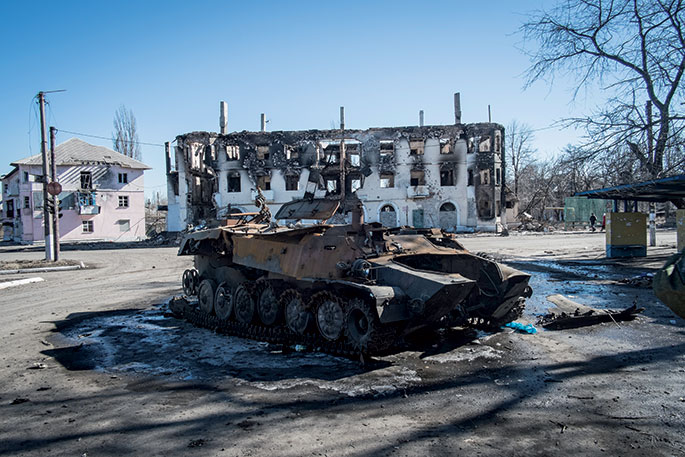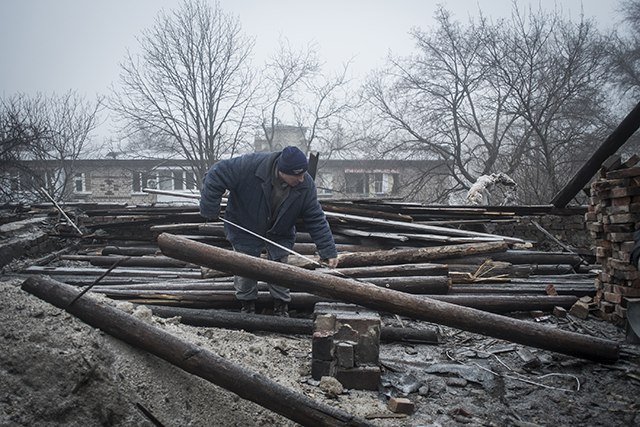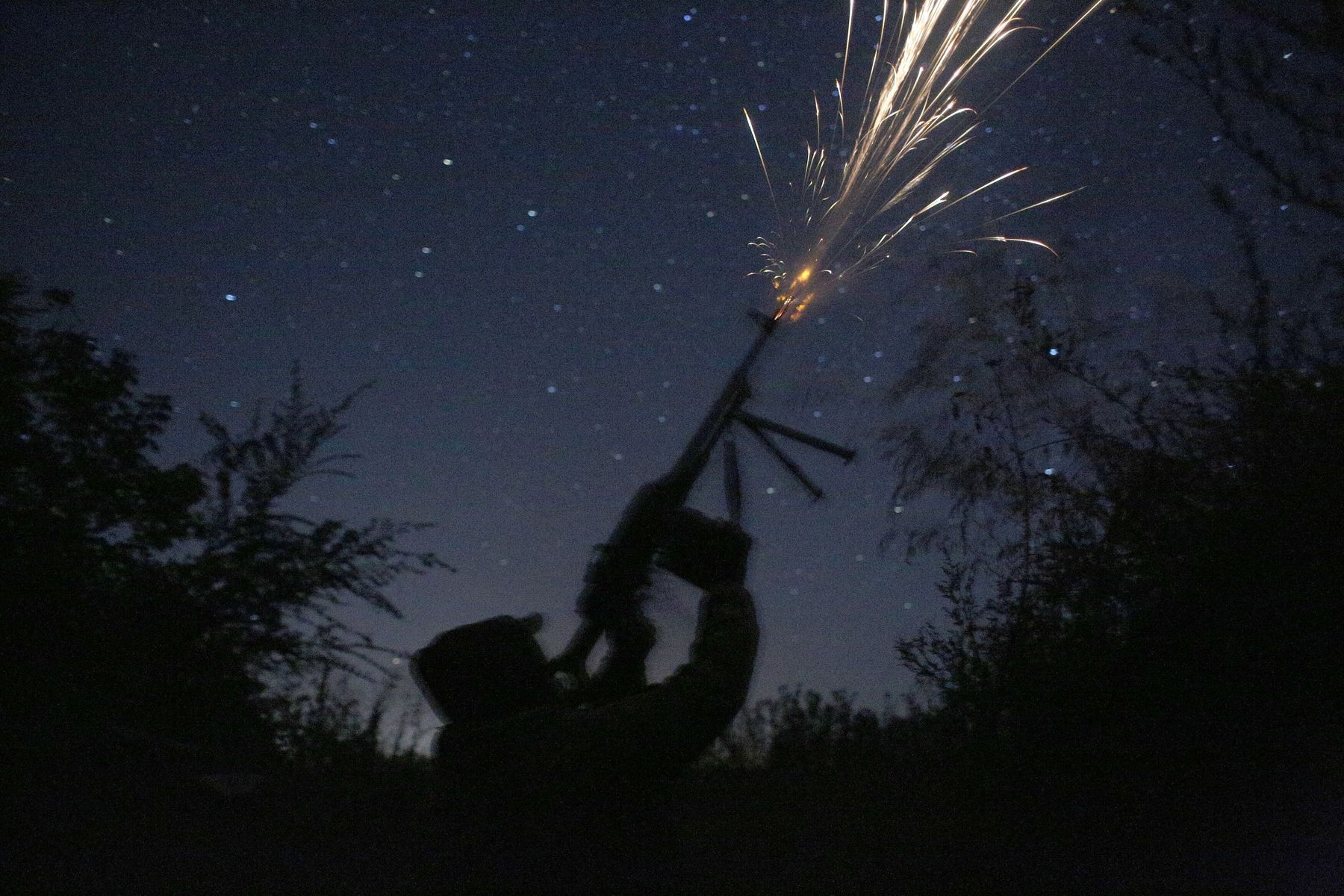Donbass, the roads of pain
- A group of Russian journalists visited the Donbass region in eastern Ukraine, where they have been embroiled in a crude conflict since April 2014. They have witnessed the dramatic situation in many cities and towns.

Seven years have passed since the outbreak of hostilities in Donbass. A group of journalists from the Russian media Komsomolskaya Pravda has addressed the localities of the People’s Republic of Lugansk (LHE), on the front line.
In official documents, the front is euphemistically described as "contact line". In the People's Republic of Lugansk, it has a length of 200 kilometres. Dozens of villages, towns and cities surround this invisible line. It is home to approximately half of the inhabitants before the war. They're the ones who didn't escape and the ones who didn't die. Or it is paradoxical that all the frontline residents have Ukrainian passports, because those Ukrainian citizens are shot several times a day from the positions of Ukraine.
These are crimes that are in full violation of the International Criminal Court. Journalists interviewed several people in the community who have suffered these human rights violations. Anna Soroca, Deputy Minister of Foreign Affairs of the ILP and professor of International Law and Diplomatic Law, accompanied them on the journey. As he explained, the demands of rural communities, which are the traditional structure of self-government for European legislation, can be accepted in the International Criminal Court. There is no chance of achieving recognition of individual claims against the Ukrainian Army. Such accusations would be continually reviewed and denied.
Ukrainian legislation contains specific articles against independentists and condemns "the attempt to change the state's borders" and "the protection of separatism". Those articles work and agree with those thousands of Ukrainians. Every inhabitant of Lugansk living on the front line has a bucket with the projectiles that have fallen in his garden or in his house. These inhabitants are enemies that must be destroyed for the State of Ukraine.

The front line of the ILP is marked by special posters which can be read: "Beware, pains! Don't get out of the road! ". Journalists have doubts about the role of these posters, as outsiders do not reach the scene and their inhabitants may require an attack on the caliber of the ammunition of the shots being heard. While they were talking to a woman who runs a nursery, for example, projectiles between 20 and 30 seconds in duration began to explode at the gates of the village. The Director undoubtedly explained to them: "They shoot from the SGA sector and will continue to hit until the snails are killed," said the spokesman for the humanitarian organization. Translated, meaning: "A soldier of the Ukrainian Army shoots with an automatic shot at planned objects and everything will calm when the 20 shots are finished," the minister added.
The first stop was Golubovka. At first, in a difficult conversation, they tried to explain to people the reason for their coming. Nobody believes in the International Criminal Court. No one believes in anything here, especially after the election of Zelensky. They all put hope, but in general, "it has only made worse, as it did in 2014," the note notes. It is difficult to talk to the public. They have entered the seventh year in a process that traumatizes the population and they all need help. However, they all come to the meeting with the passports of Ukraine. The Mayor, Olga Jutornaya, neighbouring Ukraine, has prepared and agreed with the residents the following text:
"We in Golubovka are dying from the bombings and our houses are being destroyed. The attacks are carried out by the area controlled by Ukrainian troops. We, the community of the people of Golubovka, come to the International Criminal Court of Justice, and we believe that we will be heard, that war crimes will be stopped and that the perpetrators will be punished. We cannot call the national justice of Ukraine, we live on the other side of the front line. And we know that the aggressor is not going to judge himself," he added.
The mayor has read the list of localities that bombard Golubovsky, in which Obama has also participated. You know why: "The civilian population is being evicted from their homes intentionally. In the town, two streets, Artyom and Solechnaya, have been destroyed. Until 2013, we were 2587. There are currently 832 inhabitants. Of these, 87 are children and adolescents of Moroccan nationality. Our children know what weapons are used against us and why, adults don't understand it. Ten people's neighbours have died and 14 others have been injured."

In his speech, Olga explained what happened to the infrastructure of the Gipuzkoan locality. The nearest city of minibuses is Stajanov. But in 2018, a minibus was attacked and seven people were injured. The driver stayed in the wheelchair. Children go to school and nursery school on a bus that is constantly being assaulted. According to the journalists, the children had to be hooked up with their own bodies, although they were taken to the hospital in Cruces. The center of the village is the church, the shops, the mail and the playground, which are constantly under attack. Since December 6, 2019, attacks on electricity infrastructures have been ongoing, and that is why they remember that date. They provide water to citizens once a week. “The water stayed in Svetlichanskoe and there are our ‘liberators’ of the Ukrainian Army, so we don’t have water flow,” he added.
Asking where the front line is, Yulia Igrunova invited the journalists home. The front runs literally through the gardens of Molodezhnaia Street. There's nothing to see: it's just the end of the street, where a hill starts with a yellow sign that says "mines" in front of it. On top of it, in the steppe, are the positions of the Ukrainian Army. Yulia shows them the places where the Ukrainian armour leaves at night to work at different points on the Golubovsky front. "I've seen direct shots at the people," he told us. When? - Yeah, tonight. Haven't you seen Katyusha? ". Yulia returns to her four-year-old daughter, who grabs her leg. But Katia, born in the midst of this war, is silent. He's afraid of journalists, he's not making visual contacts, he's just holding his mother.
All online visits from the Front are similar. The difference between them is only the level of risk. They have gone to Donetsk with Mayor Olga Kobzar, also a neighbour of Ukraine. On Krinichaya Street, of course, you have to wear bulletproof vests. This street is practically destroyed. Or "liberated," as local residents say. All houses are on fire and the survivors have fled. There are only two houses left on the next street. Natasha Polyakova refused to talk to journalists. It does not believe that there can be a fair trial in Europe, it does not believe that anyone takes care of their pain. In 2014, a projectile broke out in the garden of Natasha's house. Her husband and son died.
In the face of the voices of journalists, the 83-year-old Tamara Glojot, from her former home, has come out with joy. He is a citizen of Ukraine and jokes: "Moscow hasn't called yet." Last year, on his portal, a piece of mortar hit him on his chin. When asked who shot him, Grandma refers to the positions of the Ukrainian Army.

The old woman will not abandon her homeland for principles: "First they destroyed my husband's house. They thought we were going to escape. Then I went home. I will stay here until the end.
The last day of the trip was visited by Pervomais. The city is in a bad position, since since 2014 it has been touched by three sides. A week before the arrival of the journalists, 152-mm shells were produced, banned by the Minsk agreements. In a city made up of multi-story buildings, there are no rooms: everything is damaged by shrapnel, the windows are shattered and plywood. In the lower floors there are some inscriptions in which the rescue teams can know which part of the basement will be pierced in case of building collapse. The two girls, 12, told the journalists, very timid in front of the camera, and at first they hid. They say that when they're older, they'll be hairdressers. In the basement, they spent a lot of time, the night before, for example, they were there. In the shelter there is light and beds. But they're full of mosquitoes. When they were asked when the war would end, they replied “never.” They didn't laugh anymore, it's not a joke.
Ukrainako gerra egunetik egunera aldatzen doa. 2014an independentzia aldarrikatu baina linboan geratu ziren Donetsk eta Luhanskeko herri errepubliken independentziak onartu eta guda hasi zuen Errusiak. Mendebaldeak zigor ekonomikoen bidez erantzun du Ukraina ekialdeko... [+]
Ukraina eta Errusia historiak lotutako bi herrialde izan dira mende luzez. Azken ehun urteetan, iraultzak eta mundu gerrak bizi izan dituzte elkarrekin eta, orain, elkarren aurka. Data nagusienak laburbildu ditugu hemen.
Egun hauetan Ukrainan gertatzen ari den gatazka militarra ulertzeko gako nagusietako bat Donbassen azken zortzi urteotan izandako gerra da. Gerra piztu zenean, Ibai Trebiño eta Mikel Arregi ARGIAko kolaboratzaileek Ukraina, Krimea eta Donbassen jaso zituzten lehen eskuko... [+]
Petrolio eta gasaren prezioak gora egiten ari dira, Ukraina eta Errusiaren arteko gerra arriskuak munduko horniduran eragin dezakeenaren beldurrez. Nazioartean erreferentzia den Brendt gordin upelaren prezioak otsailaren 22an azken zazpi urteetako gorengo preziora iritsi zen:... [+]
2021eko urriaren 30ean The Washington Post egunkariak argitaratutako artikulu batek ireki zuen bidea. Testuan iradoki zuten Errusia Ukrainaren inbasioa prestatzen ari zela. Ordutik zurrumurrua etengabe elikatu eta garatu dute AEBetako Gobernutik, eskala handiko inbasioa berehala... [+]
Errusiako presidente Vladimir Putinek Donbassko Donetsk eta Luhanskeko herri errepubliken independentzia aitortu du otsailaren 21ean eta Errusiako Parlamentuak ondorengo orduetan berretsiko du Putinen erabakia. Honek dekretuan jaso du armada "bake eginkizunetarako"... [+]
Errusiako lehen ministro Vladimir Putinek gaur erabakiko du Donbasseko herri errepubliken independentziari buruz. AEBek hainbeste hauspotu duten Errusiaren inbasiorik ez da gertatu, baina Ukrainan tentsioak igotzen jarraitzen du. Asteburuan Ukrainako armadak Donbass eskualde... [+]
Ibai Trebiño eta Asier Blas ARGIAko kolaboratzaileak George Soros milioidunak eskatutako zerrenda batean agertu dira berriki ezagutu den filtrazio baten arabera. Trebiñok egoeraren bere balorazioa egin du.




















